Inclusion on Campus
To be an effective leader, it is important to challenge one’s assumptions of others and create spaces where traditionally silenced groups are given an opportunity to be heard. As part of World Learning’s Global UGRAD OPAL course module “Beyond Tolerance: Inclusion and Diversity Practices,” students were requested to attend an event or club meeting that serves as a space for minority students who are typically less represented in U.S. government, businesses, and the media. Below are some clubs and safe spaces students discovered!
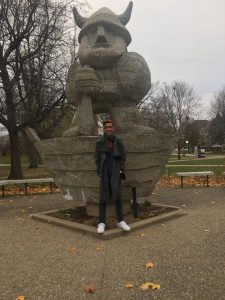
Gay-Straight Alliance Club: Earl Castuera Magahis, The Philippines, Augustana University
A fellow Global UGRAD student and I attended the first Gay-Straight Alliance Club meeting of the Fall Semester. We met about 20 people who identify as either straight or a part of the LGBT community. Most of the members identify as women and some identify as gender fluid. We talked about the future events that the club will be holding for the entire school year: a table event, hosting a school dance, and much more. During this time, I realized that back home in the Philippines, people are extremely conservative. Therefore, I never really got the chance to explore my own sexuality. However, hearing stories from members of this club will definitely help me find my path. In return, I will help the club set up for events that aim to make the university safe and inclusive for LGBT people. This is my opportunity to live my life the way I want it to be without being scared about what society thinks about me. With the knowledge I gained from this club, I will teach my friends back home about accepting people who identify as LGBT, and not just tolerating them.
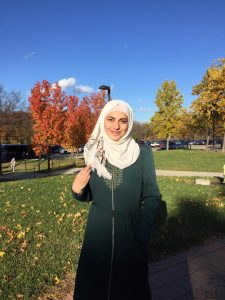
The Disability Center: Iman Saraj, Palestinian Territories, Wright State University
At Wright State, I believe there are numerous organizations that endorse diversity and inclusion. What I have been mostly fascinated by here are the services provided for people with disabilities. The university has designed walking pathways, lecture rooms, and recreation centers with people with disabilities in mind. There is a special office called the The Disability Center, which provides sessions for students to express their needs and how they can be fully met. Students can also volunteer to help students with disabilities when it comes to classes and daily activities. I believe that is an amazing example of inclusion. In Palestine, there is an office for people with disabilities on campus. However, it is not as inclusive. I would add a lot to its services and include more people who can help provide ideas on the resources required to help people with disabilities achieve independence. The fact that I got to see the services at this university is amazing and it definitely encouraged me to take action and make a difference.
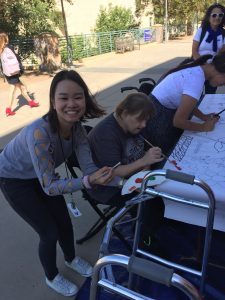
Vietnamese Student Association: Duangchai Songeun, Laos, California State University, San Marcos
The Vietnamese Student Association has a meeting every Thursday for anyone who is interested in getting involved and meeting new friends. However, you do not have to be Vietnamese to join. This is a safe space for other Asians/Asian Americans who can share and gain advice about being an Asian student at the university and how to fit in with others in class. I think this is a very good club to join because it is a space where students facing similar situations can get advice from one another and make new friends. Being away far from home is sometimes difficult, but when you get to be with people with similar thoughts and interests, you feel at home.
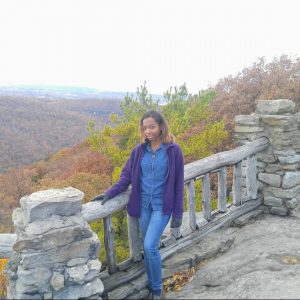
Black Culture & Research Club: Lynn Gardy Balmir, Haiti, West Virginia University
I joined the African Students Association and went to an event hosted by the Black Culture and Research club. I attended a lecture by Dr. Jessica C. Harris on her research: “The experience of Women of Color: Undergraduate Students who are Survivors of Campus Sexual Assault.” Dr. Harris mentioned that being neutral in terms of race and ethnicity when discussing sexual violence or abuse may not be beneficial for women who have different backgrounds and identities from the majority. Therefore, I concluded that people’s differences in terms of backgrounds and identities should be taken into consideration not only when it comes to organizations and services, but also in terms of sexual assault-related research and interventions. Additionally, even within minority groups, we should pay special attention to people’s differences.
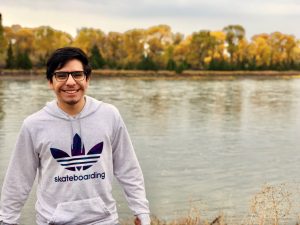
International Student Network: Juan Adolfo Orozco Coloma, Guatemala, Carroll College
In the state of Montana, 87% of the people identify as white. This means there is not as much ethnic diversity in the state. Also, colleges and universities in the state have low numbers of international students. I attended an International Student Network (ISN) meeting and learned that ISN is letting people on campus know about international students and their cultures. In the activities planned for this semester, there’s an international student night where we talk about our countries and our cultures. There will also be a day where we cook food from our countries and share it with other students. ISN also provides advice for international students on how to deal with micro aggression and any kind of racism or discrimination. They provide resources and a space to talk about any problem we may have. One idea I have is to create a website or an app where any international student could write about his or her experience and give some advice to future international students.